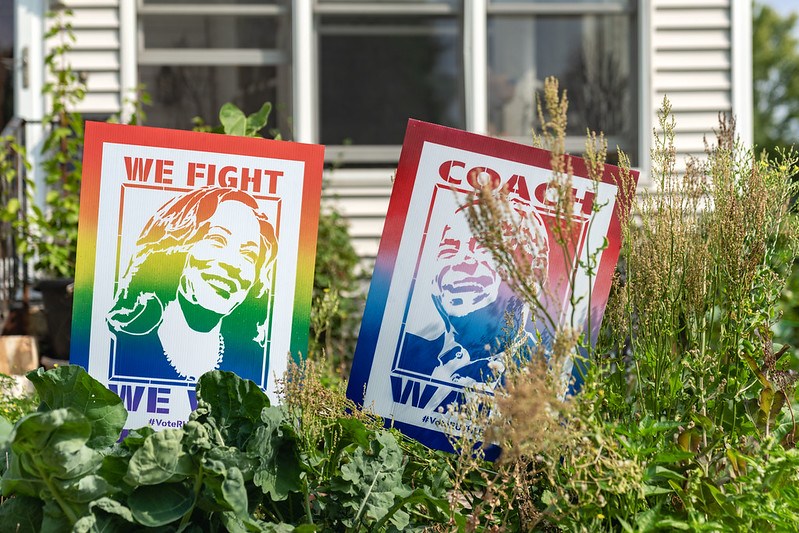

Photograph Source: Lorie Shaull – CC BY 2.0
I received a text message from a close family member in the wee hours of the morning of November 6, just after, I presume, it had become apparent who had won the election.
“When they come for me for the camps,” it read, “I hope you remember your vote.”
I believed the author of this email was genuinely afraid of being carted off to some kind of internment camp, so I attempted to calm her fears by pointing out that Trump had said in 2016 that if elected, he would put Hillary Clinton in prison, but that he hadn’t done that, that that promise had been just so much blustering.
Instead of assuaging her fears, though, this response ignited a fury of hatred (or perhaps it had been hatred all along rather than fear).
“Listen to what you said,” her next text read. “He threatened to put Hillary in prison. Is that normal? No. He won’t have the guardrails this time. But you were FOR this, this despicable person who made such threats and now will be in a position to carry them out. Fuck you. You are a Nazi.”
This vitriol was hurled at me by someone I love and has wounded me so deeply that I’m still hurting from it. Maybe some of you reading this will think that I deserved such treatment. Too many people think that anyone who would vote for Trump deserves such treatment, or even worse.
The thing is, I didn’t vote for Trump. I voted for Jill Stein and the author of those abusive text messages knew it.
Trump won by a landslide. I feared that was going to happen, actually, because I watch a lot of YouTube and it had been open season on Harris on YouTube ever since she had been declared the official Democratic candidate for the presidency. Everyone had jumped on the bandwagon, including countless Black and Latinx Vloggers. I feared Trump was going to win by a landslide, but felt that the bright side of this was that I could vote my conscience without subjecting myself to the abuse that I had endured in the 2016 election when I had also exercised that right by voting for Stein.
I believe, and have argued in print, that people voting their consciences is the only way democracy can actually work, so I have always done it and been open about it, even when I knew it would subject me to abuse. This time, though, it seemed to me, no one could possibly accuse me of throwing the election. This time, I thought, no one will be able to hurl the kind of abuse at me I had earlier endured.
I was wrong. The tiny smattering of votes Jill Stein received had no outcome whatever on the election. So what was my crime? I’m forced to infer that it was the simple fact that I had dared to follow my conscience, that I had refused to be bullied and browbeaten into voting for a candidate I didn’t like simply in order to avoid the evil of one who was even worse, that I had resisted the pressure to toe the Democratic-party line, despite that toeing that line would have changed nothing, nothing that is except my self-esteem. I committed the crime of thinking for myself and acting in a manner consistent my conscience, and for that I was viciously attacked by someone I love.
That’s right, I was viciously attacked by someone I love simply for daring to do what I felt was right, even when it made no difference to the outcome of the election. Toeing the Democratic line which used to be justified as a means to the end of winning an election, has now become an end in itself — and anyone who fails to recognize it as such is viciously attacked.
Whose behavior in this scenario, I ask you, is more reminiscent of the National Socialist’s?
There are lots of conservatives who think the Democrats are the real Nazis. That’s not my point, though. My point here is not to determine which side is actually more hospitable to hate. My point is that there is too much hatred and intolerance in public rhetoric, that it’s a poison, and that it’s going to kill us.
Conservatives make fun of “libtards,” and liberals (or at least people who like to think of themselves as liberal), pillory conservatives as racists, misogynists, and fascists. Both sides have abandoned all pretext of civility. Public intellectuals have openly defended “going low” against, you know, bad people. The danger here isn’t simply that the vicious bullying that has come to characterize too much public rhetoric stokes the flames of hatred. The danger is even deeper and more disturbing than that. We are sending a relentless message to today’s young people that human beings are vicious and intolerant. That they will turn on one another at the slightest provocation and that the worst such provocation is the temerity to think for oneself.
And we wonder why there is an epidemic of depression among young people.
The post The One Thing Needful: Some Post-Election Reflections appeared first on CounterPunch.org.
This post was originally published on CounterPunch.org.